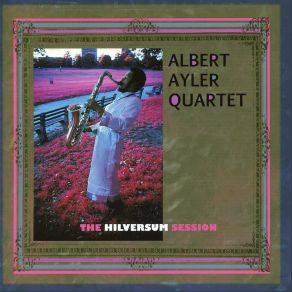The Hilversum Session
Download links and information about The Hilversum Session by Albert Ayler Quartet. This album was released in 1964 and it belongs to Jazz, Avant Garde Jazz genres. It contains 6 tracks with total duration of 40:11 minutes.

|
|
|---|---|
| Artist: | Albert Ayler Quartet |
| Release date: | 1964 |
| Genre: | Jazz, Avant Garde Jazz |
| Tracks: | 6 |
| Duration: | 40:11 |
| Buy it NOW at: | |
| Buy on iTunes $5.94 | |
| Buy on Amazon $7.99 | |
| Buy on iTunes $7.74 | |
Tracks
[Edit]| No. | Title | Length |
|---|---|---|
| 1. | Angels | 6:52 |
| 2. | The Wizard (C.A.C.) | 4:58 |
| 3. | Ghosts | 7:28 |
| 4. | Infant Happiness | 6:04 |
| 5. | Spirits | 9:08 |
| 6. | No Name | 5:41 |
Details
[Edit]The Hilversum Session by Albert Ayler is one of those legendary recordings in free jazz. It was recorded in a Netherlands radio studio in front of a small invited audience, at the end of the Ayler Quartet's European tour on November 9, 1964. The band — Ayler, Don Cherry, Gary Peacock, and Sunny Murray — had been playing Ayler's tunes for months and were uncanny in their ability to hear one another and improvise together at that point. It was also the last time the group would record together under Ayler's name as a quartet, and they went out at a peak. The recording itself remained unissued until 1980, when it appeared on an LP on the long-defunct Osmosis label. Most of the tunes were, and remain, fairly common Ayler creations. "Ghosts" was recorded numerous times in 1964, and "Spirits" first appeared on both Witches & Devils and on a record with the same title; both appeared on Spiritual Unity; while the tune "C.A.C," is actually the original title for the cut "The Wizard," also from Spiritual Unity. According to the liner notes, the closing number, "No Name," was added as a coda to the infamous "Bells," issued in 1965, and in its relatively melodic beauty reveals another dimension to the fierce but inspiring improvisation by this quartet, who would take Ayler's skeletal melodies and move them to the margins of musical language itself. "Infant Happiness," by Cherry, is the only piece not authored by Ayler. The saxophonist kicks it off before he is joined by the trumpeter near the end of bar four in a knotty but wonderfully nursery rhyme-like melody that is reminiscent of the music Cherry played with his former and future boss Ornette Coleman. This set is a defining moment, not just historically, but musically. The intense listening and interplay that goes on here is inspiring. Gary Peacock and Sunny Murray may have played better elsewhere, but they never played with the kind of deep communication they enjoyed together as a rhythm section and with other front-line players than they do here. Ayler is no longer striving to find the outer limits of spiritual expression in his music; it's all on display here, and Cherry, the inveterate and outrageously talented listener/musician is in full bloom, untethered as a soloist, yet, like the other three, remaining an inextricable part of a band. These cats play together with the kind of intuition and foresight only a seasoned group can; they understand the nuances of the language they are speaking and know how to offer those to the listener emotionally, musically, and even culturally. This is a welcome issue.